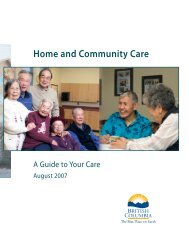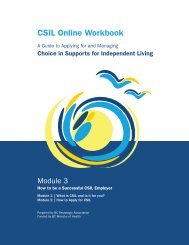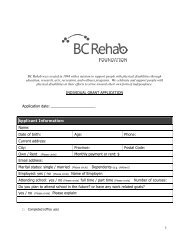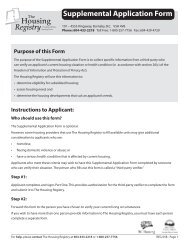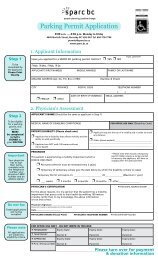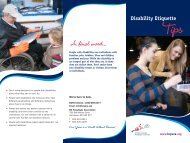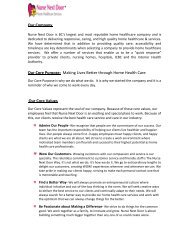Alcohol Use after Spinal Cord Injury - SCI Information Database
Alcohol Use after Spinal Cord Injury - SCI Information Database
Alcohol Use after Spinal Cord Injury - SCI Information Database
You also want an ePaper? Increase the reach of your titles
YUMPU automatically turns print PDFs into web optimized ePapers that Google loves.
Healthy Living<br />
<strong>after</strong> <strong>Spinal</strong> <strong>Cord</strong> <strong>Injury</strong><br />
<strong>Spinal</strong> <strong>Cord</strong><br />
<strong>Injury</strong> and<br />
<strong>Alcohol</strong> <strong>Use</strong>
You probably already know that heavy alcohol<br />
use is a major cause of physical injuries and<br />
other health problems. At the same time, alcohol<br />
use is legal and socially acceptable in moderation.<br />
You may wish to continue enjoying alcohol when<br />
you return to the community following your<br />
spinal cord injury, and are wondering how safe<br />
it is for you to do so.<br />
Because of your spinal cord injury, alcohol can<br />
pose additional risks to your health. Even if you<br />
only drink occasionally, it's important to understand<br />
the effects of alcohol and how to reduce<br />
these risks. That's what this brochure is about.
What should I know about alcohol<br />
<strong>Alcohol</strong> is a drug — a depressant drug. It is just as<br />
powerful as some street drugs and many prescription drugs.<br />
<strong>Alcohol</strong> slows down your ability to think, react and<br />
make judgments.<br />
<strong>Alcohol</strong> can cause diseases of the liver, heart, brain and<br />
digestive system. It can cause cancers of the mouth,<br />
throat and digestive tract. It also affects the bladder<br />
and kidneys.<br />
<strong>Alcohol</strong> is alcohol, whether you are drinking beer, wine<br />
or liquor. It's not so much what you drink that counts,<br />
but the amount of alcohol in your drink and the number<br />
of drinks you have.<br />
As a rough guide, one 12-ounce bottle of regular beer<br />
contains the same amount of alcohol as one five-ounce<br />
glass of table wine, a one-and-a-half-ounce shot of liquor<br />
(whisky, rum, vodka, gin) or the popular summer coolers.<br />
The amount of alcohol in these drinks is typically<br />
referred to as a standard drink.
What are the risks related to<br />
spinal cord injury<br />
Bladder and Kidney Damage<br />
<strong>Alcohol</strong> causes your body to produce a larger volume of<br />
urine. This will cause your bladder to fill more quickly and<br />
can cause your body to dehydrate.<br />
Waiting too long to empty your bladder causes excessive<br />
stretching and weakening of the muscle lining. It can also<br />
cause urine to back-flow into the kidneys, which can lead<br />
to infection and kidney damage.<br />
Dysreflexia<br />
An overly full bladder can lead to autonomic dysreflexia<br />
(also known as hyperreflexia or AD). This is a potentially<br />
dangerous condition. The sudden rise in blood pressure<br />
associated with dysreflexia can lead to convulsions,<br />
stroke or even death.<br />
Watch for these signs of<br />
dysreflexia:<br />
• excessive sweating above<br />
the level of your injury<br />
• a flushed face<br />
• goose bumps and chills<br />
• a pounding headache.
Skin Breakdown<br />
Using alcohol may increase your risk of damaging your<br />
skin in the following ways:<br />
• <strong>Alcohol</strong> may make you dehydrated, leaving your skin<br />
more prone to pressure sores.<br />
• While drinking, you may forget to shift positions to<br />
relieve pressure points. If you fall asleep in your<br />
wheelchair, you are more likely to develop a serious<br />
pressure sore.<br />
• Drinking too much can result in an involuntary bladder<br />
or bowel movement, which can irritate your skin.<br />
• If you drink heavily on a regular basis, you may pay<br />
less attention to good nutrition, which is important for<br />
maintaining healthy skin.<br />
Risk of Choking<br />
Anyone who drinks to the point of becoming sick is at<br />
risk of choking on his or her vomit. For those with<br />
certain levels of spinal cord injury, the risk of choking<br />
is much greater.
Interactions between <strong>Alcohol</strong> and Medications<br />
If you drink alcohol while you're using medication, the<br />
alcohol may react to the other drug (or combination of<br />
drugs) in unexpected ways. Depending on the type of<br />
medication you are taking, alcohol may interact with the<br />
medication to cause:<br />
• increased drowsiness, dizziness, fatigue and loss of<br />
coordination<br />
• a decrease in the effectiveness of the medication<br />
• an increased or longer-lasting effect of the medication<br />
• new side effects that you would never experience using<br />
alcohol or medication alone.<br />
Even medications that are sold over-the-counter,<br />
including painkillers, cold medications, and some types<br />
of antihistamines, can interact with alcohol.<br />
Don't think that simply skipping your medication on the<br />
day you drink will help — some drugs can stay in your<br />
body for many days.<br />
Always consult your doctor or pharmacist before deciding<br />
to use alcohol.
Physical Injuries<br />
After a spinal cord injury, it is important to stay alert to<br />
prevent falls, burns or other accidents. That is particularly<br />
important in the early months following your injury, when<br />
you may still be healing and are learning new skills. If you<br />
drink alcohol, you may find your coordination, reaction<br />
time and judgment affected, even before you begin<br />
to feel intoxicated. <strong>Alcohol</strong> also tends to disrupt<br />
newly learned skills more than it does old ones.<br />
<strong>Alcohol</strong> Addiction<br />
People with a spinal cord injury are no more likely to<br />
become addicted to alcohol than anyone else. However,<br />
learning to live with a spinal cord injury is very stressful.<br />
Because alcohol is a powerful painkiller and mood modifier,<br />
you might be tempted to use it to help you deal with<br />
problems related to your spinal cord injury. While alcohol<br />
can give temporary relief from these problems, over the<br />
long term, it will make them much worse.
What can I do to reduce the risks<br />
associated with alcohol and my<br />
spinal cord injury<br />
Not drinking at all, of course, is the safest way to avoid<br />
alcohol-related problems. But if you decide you want to<br />
use alcohol in moderation, you may find the following<br />
suggestions useful in reducing the risks:<br />
• Talk to your doctor about any alcohol-related risks<br />
that are particular to you and your physical condition.<br />
• Check with your pharmacist or doctor to learn the<br />
effect of mixing your medications with alcohol.<br />
Remember that, in most cases, skipping doses of<br />
medication won't greatly reduce the risk of drugs and<br />
alcohol interacting.<br />
• When you do drink<br />
alcohol, keep track of<br />
how much you drink.<br />
Know the quantity of<br />
alcohol in your favourite<br />
beverages. Measure<br />
your drinks and keep<br />
track of the number of standard drinks you are consuming.<br />
• Sip — don't gulp — your drinks. And space them out<br />
(no more than one per hour).<br />
• Avoid using alcohol daily. Drinking daily gradually builds<br />
up your body's resistance to alcohol, which can lead to<br />
heavier use.
• Make at least every other drink<br />
a non-alcoholic beverage. This<br />
will help prevent dehydration and<br />
make it easier to space your drinks.<br />
• As an alternative to alcoholic beverages, try alcoholfree<br />
or low-alcohol beer or wine. Shop around until<br />
you find a brand you like. Many people find that these<br />
alternatives taste just as good as regular beer and wine.<br />
• Be kind to your bladder. Keep track of your total<br />
fluid intake (non-alcohol as well as alcohol) and be<br />
aware of the effect that alcohol has on your urine<br />
output. If you have more than one or two drinks, be<br />
prepared to use a catheter more frequently.<br />
• Watch for signs of dysreflexia.<br />
• Stay alert to prevent accidents or falls. If you are<br />
drinking for the first time in a while, or your<br />
medications have changed since you last drank alcohol,<br />
be particularly careful. You may become impaired by<br />
a much smaller amount of alcohol than before.<br />
• Never drink and drive. Doing so endangers the safety<br />
of others as well as your own.<br />
• Don't use alcohol as a medication for spasms, pain or<br />
sleep disturbances. Don't use it to cope with problems<br />
and worries. In the long term, drinking to cope with<br />
physical or emotional problems will just make life more<br />
difficult. Talk to your doctor.
How much is too much<br />
Canada's Low-Risk Drinking Guidelines recommend that:<br />
• individuals drink no more than two standard drinks on<br />
any one day<br />
• women have no more than 9 drinks over the period of<br />
one week<br />
• men have no more than 14 drinks per week.<br />
Note that these recommendations are based on research<br />
with the general population. For people with spinal cord<br />
injuries, the safe level of alcohol consumption is likely to<br />
be less than it is for people without disabilitites.
Where can I get more information<br />
If you are concerned that drinking is interfering with<br />
your life (your health, safety, rehabilitation, relationships,<br />
job, studies, or ability to care for yourself) take action<br />
quickly — before the problems get out of control. Many<br />
people find they can quit or cut down on their drinking on<br />
their own, or with very little help. Others seek the<br />
guidance of professional counsellors or self-help groups.<br />
Don't let personal pride stop you from getting help if you<br />
need it. More than a quarter of all alcohol users run<br />
into problems with drinking at some point in their lives.<br />
Drinking problems do not indicate personal weakness.<br />
They can and do affect men and women of all ages and<br />
from every walk of life.<br />
Many sources of help are available. These include individual<br />
or group counselling, inpatient or outpatient treatment<br />
programs, self-help books, and self-help groups. Your<br />
local Canadian Paraplegic Association office or regional<br />
alcohol and drug information centre can help you locate<br />
the closest accessible services.<br />
Reminder<br />
This booklet provides important information about alcohol<br />
use <strong>after</strong> spinal cord injury; it does not address all of<br />
the issues relevant to your particular situation. If you<br />
have additional questions, please discuss them with your<br />
physician or another health care professional.
Toronto Rehab gratefully ackowledges the support of<br />
GLUCKSTEIN<br />
& ASSOCIATES<br />
P E R S O N A L I N J U R Y L A W Y E R S<br />
595 Bay Street, Suite 401, P.O. Box 53<br />
Toronto, ON M5G 2C2<br />
Tel. 416-408-4252<br />
Fax. 416-408-4235<br />
www.gluckstein.com<br />
for their generous sponsorship of this handbook.<br />
Acknowledgment<br />
This booklet was adapted by the Toronto Rehabilitation Institute's<br />
<strong>Spinal</strong> <strong>Cord</strong> Rehabilitation Program from an earlier version developed<br />
in collaboration with the Addiction Research Foundation (now the<br />
Centre for Addiction and Mental Health) and the Canadian Paraplegic<br />
Association Ontario. The earlier version was funded in part with<br />
a grant from the Rick Hansen Man-in-Motion Legacy Fund.<br />
Toronto Rehabilitation Institute<br />
A Teaching Hospital of the University of Toronto<br />
Lyndhurst Centre<br />
520 Sutherland Drive<br />
Toronto, Ontario M4G 3V9<br />
Tel: 416-597-3422, ext. 6000<br />
Fax: 416-422-5216<br />
Copyright ©2003, Toronto Rehab Toronto, Ontario, Canada. This booklet<br />
may be copied freely, but cannot be altered without permission.



